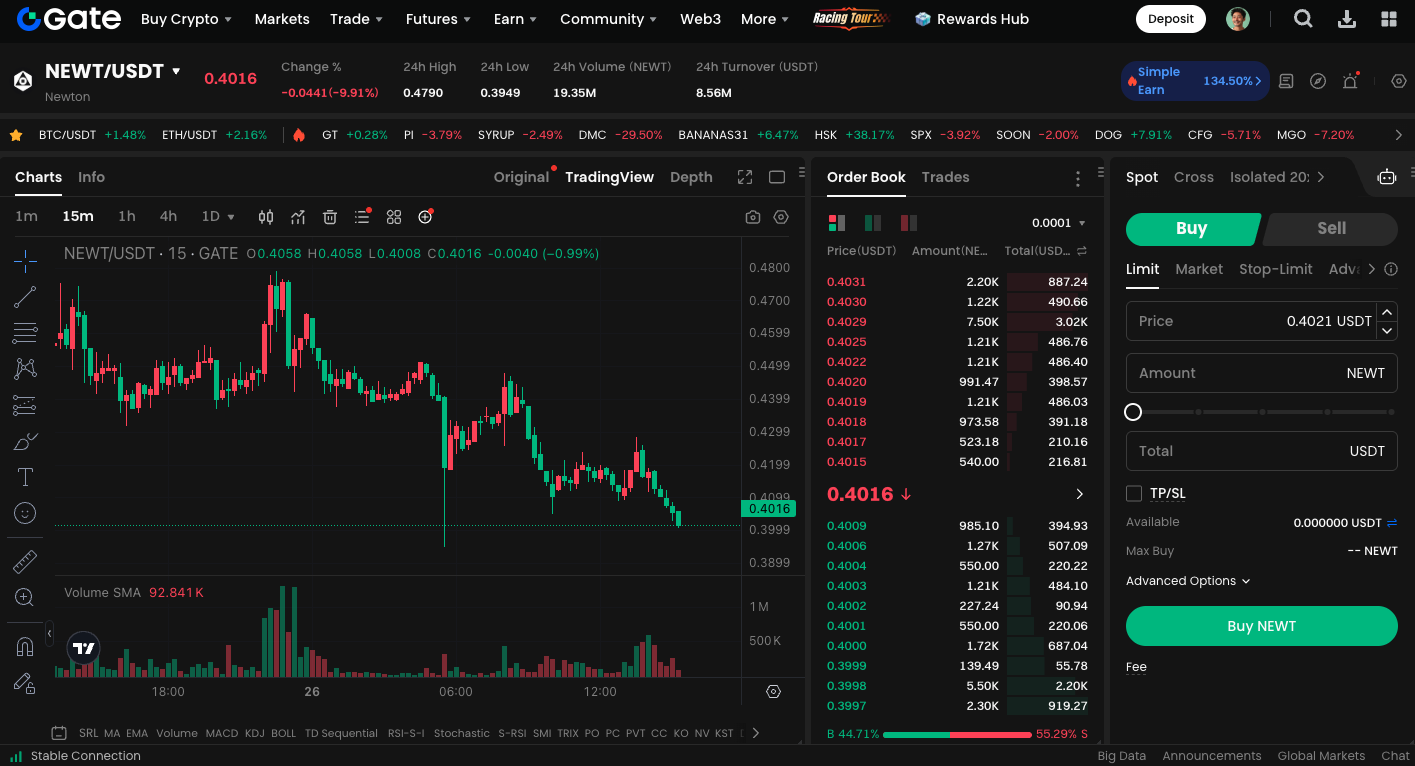Apa itu Newton Protocol (NEWT)?
Apa itu Protokol Newton?

(Sumber: blog.newt.foundation)
Protokol Newton (NEWT) didedikasikan untuk menangani masalah inti kurangnya kepercayaan dalam otomatisasi dan kompleksitas operasi lintas rantai di dunia kripto. Protokol ini dibangun bersama oleh tim Magic dan Yayasan Magic Newton. Newton bukan hanya sekumpulan infrastruktur otomatis; ini adalah protokol ekonomi terdesentralisasi yang benar-benar baru yang memungkinkan pengguna untuk secara otomatis menjalankan tugas melalui agen pintar dalam arsitektur multi-rantai, dengan setiap langkah operasi dapat diverifikasi dan dilacak secara kriptografi.
Sumber masalah saat ini dari Web3 dan solusi Newton
Meskipun Magic secara signifikan menurunkan hambatan masuk melalui dompet tersem-bunyi, operasi pengguna di blockchain masih terfragmentasi, manual, dan berisiko tinggi, terutama ketika berkaitan dengan transaksi lintas rantai, manajemen staking, dan penyeimbangan aset, yang sering kali menghalangi pengguna umum. Selain itu, banyak solusi otomatis di pasar bergantung pada bot Telegram atau alat terpusat, yang sangat kurang dalam hal keamanan dan transparansi.
Protokol Newton dirancang untuk mengatasi masalah-masalah ini. Ini menggabungkan bukti tanpa pengetahuan (ZKP) dengan lingkungan eksekusi tepercaya (TEE) untuk mencapai otomatisasi yang dapat diverifikasi tanpa perlu mempercayai pihak ketiga. Dari strategi lintas rantai, eksekusi perdagangan, dan penyeimbangan hingga strategi yang didorong oleh AI, semuanya dapat ditangani oleh agen sambil memastikan bahwa setiap langkah tetap dalam kontrol pengguna.
Fungsi inti dan filosofi desain dari protokol
Desain Protokol Newton didasarkan pada tiga prinsip inti:
Otonomi Terbatas
Pengguna menetapkan batas perilaku agen melalui zkPermissions, termasuk batasan pendanaan, area aktivitas, dan kondisi operasional. Sistem menegakkan batasan ini untuk mencegah penyalahgunaan kekuasaan.Integritas yang Dapat Diverifikasi
Semua tindakan yang dilakukan oleh agen akan menghasilkan bukti ZKP, memastikan bahwa perilaku mereka konsisten dengan otorisasi pengguna. Lapisan jaminan ini sangat penting, terutama ketika melibatkan penalaran AI, data off-chain, atau transaksi bernilai tinggi.Reputasi yang Diperoleh
Setiap agen akan mengumpulkan poin reputasi dan akan mengalami penalti ekonomi ketika melanggar aturan, menciptakan struktur yang stabil yang hidup berdampingan dengan insentif dan hukuman.
Arsitektur ini tidak hanya meningkatkan keamanan dan transparansi tetapi juga menciptakan pasar agen terdesentralisasi yang saling menguntungkan bagi pengguna dan pengembang.
Arsitektur Pengembang dan Agen
Newton menyediakan Software Development Kit (SDK) untuk membantu pengembang membangun Agen dan mengubah layanan off-chain menjadi agen yang dapat diverifikasi. Pengembang dapat mendefinisikan:
- Format Masukan dan Keluaran
- Estimasi biaya eksekusi
- mekanisme verifikasi sertifikat
Pada saat yang sama, agen dapat mendaftarkan proksi mereka dengan Model Registry di protokol, memungkinkan operator untuk mendaftarkan dan menyediakan layanan eksekusi. Arsitektur ini secara signifikan menurunkan hambatan masuk dan mendorong pengembang luar biasa untuk menciptakan strategi otomatisasi yang lebih kuat.
tokenomik $NEWT
Token asli dari Newton Protocol, $NEWT, adalah inti dari seluruh operasi platform, dengan total pasokan 1 miliar token dan pasokan yang beredar awal sebesar 215 juta token (yaitu, 21,5%). Struktur distribusinya adalah sebagai berikut:
Distribusi yang berorientasi pada komunitas: 60%
- Dana Pengembangan Ekosistem Onchain
- Dana Pertumbuhan Ekosistem Onchain
- Onchain Foundation Vault
Ketiga ini ditetapkan untuk ekologi dan infrastruktur, dengan pembukaan linear 48 bulan, di mana 20% akan dibuka pada TGE.
Alokasi Orientasi Internal: 40%
- Kontributor Inti: 18,5%
- Pendukung Awal: 16,5%
- Magic Labs: 5%

(Sumber: blog.newt.foundation)
Ketiga-tiganya memiliki periode penguncian 12 bulan, setelah itu akan dilepaskan secara linier selama 36 bulan. Semua token yang tidak terkunci tidak diizinkan untuk beredar di pasar sekunder.
Penggunaan Token
Staking dan Keamanan Jaringan
$NEWT akan digunakan untuk mekanisme konsensus Delegated Proof of Stake (dPoS) dari protokol, memungkinkan pemegang token untuk mendelegasikan token mereka kepada validator dan mendapatkan imbalan staking.biaya transaksi
Saat pengguna mengeluarkan instruksi operasi atau memulai transaksi melalui agen, mereka akan menggunakan $NEWT sebagai biaya gas. Newton akan menerapkan mekanisme serupa EIP-1559 untuk menangani urutan transaksi dan biaya.Pendaftaran Model dan Layanan
Pengembang perlu membayar $NEWT untuk mendaftarkan model proksi mereka di Model Registry. Setelah model diadopsi oleh operator, pengembang dapat memperoleh bagi hasil berdasarkan penggunaan.fungsi tata kelola
Pemegang token dapat berpartisipasi dalam tata kelola protokol, mengusulkan dan memberikan suara pada keputusan kunci seperti audit model, penyesuaian biaya, dan penggunaan dana pengembangan ekologi.
Mulai trading spot NEWT segera:https://www.gate.com/trade/NEWT_USDT

Ringkasan
Automasi yang dapat diverifikasi yang diusulkan oleh Protokol Newton tidak hanya mengisi kesenjangan kepercayaan dalam otomatisasi Web3 yang ada tetapi juga membangun fondasi kepercayaan yang solid untuk ekonomi terdesentralisasi yang didorong oleh AI, memungkinkan pengguna untuk mengungkapkan tujuan mereka dan memungkinkan agen untuk mengeksekusinya dengan aman. Dengan integrasi mendalam antara AI dan blockchain, Protokol Newton akan menjadi infrastruktur kunci yang mendukung era baru keuangan terdesentralisasi, bisnis agen, dan otomatisasi on-chain.
Artikel Terkait

Analisis Mendalam Kebijakan Tarif Trump 2025

Apa Itu ZEREBRO: Sistem Inovatif yang Menembus Batasan Pembuatan Konten AI

Fartcoin: Naiknya Seri AI Agent MEME Raja Baru

Prediksi Harga XRP: Analisis Tren Masa Depan dan Peluang Investasi

Analisis Trend dan Prospek Masa Depan Cardano (ADA)
